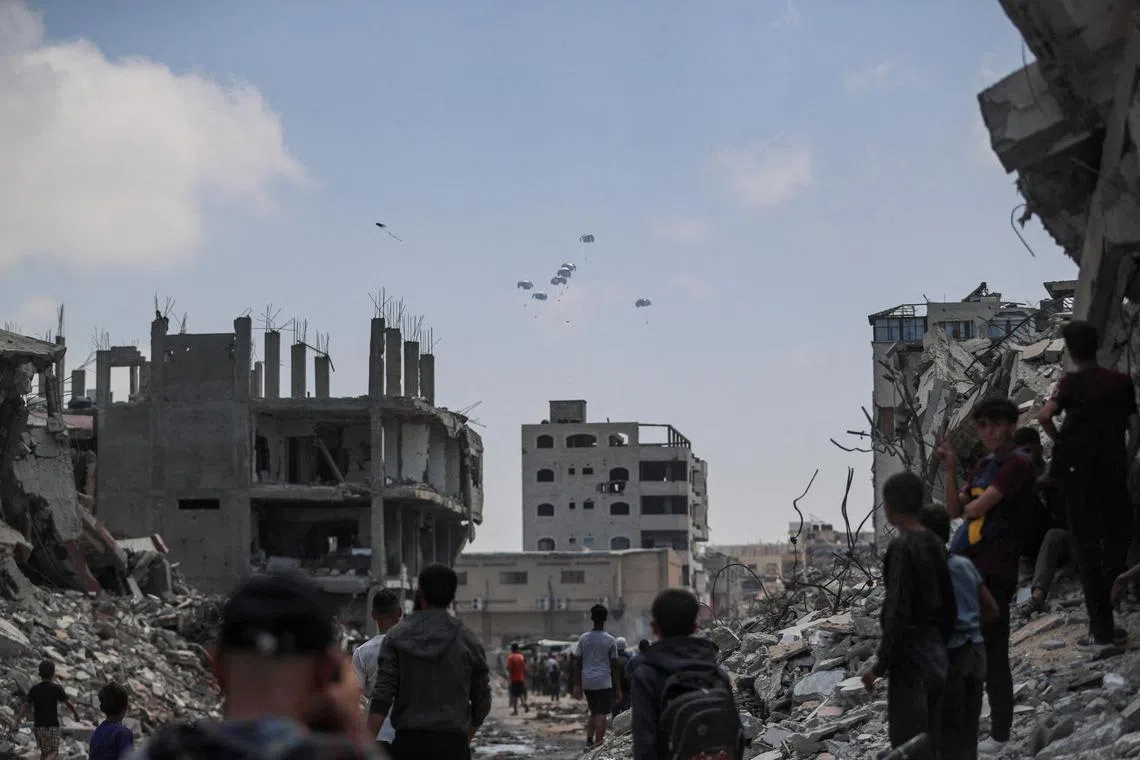News analysis
Israeli critics say Netanyahu plan to capture Gaza City lacks clear aims
Sign up now: Get ST's newsletters delivered to your inbox

While decimating Gaza, the Israeli military has failed to dislodge Hamas’ remaining fighters.
PHOTO: REUTERS
JERUSALEM – Since its announcement on Aug 8, Israel’s plan to capture Gaza City
Palestinians and foreign leaders say the plan will prolong the war and the suffering of Palestinian civilians. The Israeli left says it will likely endanger hostages still held by Hamas. The Israeli right says it will not do enough to defeat the Palestinian armed group.
Now, a new criticism is emerging within Israel: There is little clarity over what exactly this operation will involve.
While there have been vague proclamations by Prime Minister Benjamin Netanyahu, Israel’s military has yet to complete the tactical battle plan.
There has been no public confirmation of how long any occupation of the city will last – or when it will begin and how it will differ from Israel’s capture of Gaza City in the opening months of the war in 2023.
Intense Israeli strikes continued overnight into Aug 11, killing several Al Jazeera journalists
But the army has not yet mobilised the tens of thousands of military reservists who will most likely be needed to carry out the broader operation. And while Israel has threatened to force out the hundreds of thousands of Palestinians still living in Gaza City, it has yet to order their expulsion.
Over the weekend, Mr Netanyahu doubled down on the threat to capture Gaza City, saying at a press briefing that Israel had “no choice” but to proceed because Hamas had not surrendered.
Yet he gave little further detail about the plan.
“What does Netanyahu want? Does he want a hostage deal or to conquer Gaza?” asked Mr Nahum Barnea, one of Israel’s best-known columnists, in an analysis published on Aug 11 in Yediot Ahronot, a centrist newspaper.
“I don’t understand what the military meaning of ‘seizing control’ is,” Mr Barnea added. “I’m not sure that anyone in the military does either.”
Regardless of its meaning, Mr Netanyahu’s decision to continue any kind of war has enraged foreign leaders, some of whom are pushing for Israel to hand over power in the Gaza Strip to an international force backed by the United Nations.
President Emmanuel Macron of France said in a statement on Aug 11 that the expansion of the war constituted “a disaster of unprecedented gravity and a headlong rush into permanent war”.
“Israeli hostages and the people of Gaza will continue to be the first victims of this strategy.”
Mr Macron added: “To this end, we propose a UN-mandated stabilisation mission to secure the Gaza Strip, protect the civilian population and support Palestinian governance.”
That alone, Mr Macron said, “can meet the needs of the people of Gaza and carry out operations to disarm and demilitarise Hamas”.
Mediators are still trying to bring about a truce between Israel and Hamas. Some Israeli officials say that by announcing a major escalation in the conflict while delaying its enactment, Mr Netanyahu may simply be trying to pressure Hamas into making greater concessions in those negotiations.
The decision to seek control of Gaza City has angered all sides – including Palestinians, Israeli critics of Mr Netanyahu who say it should never have been made at all and Israeli right-wingers who say the plan does not go far enough.
“The only tangible idea is to protract the war. The details do not matter to Netanyahu,” said Mr Alon Pinkas, an Israeli political commentator and former ambassador.
“The war never had clear political objectives aligned with military operations. There was never an endgame, never a political vision of post-war Gaza,” Mr Pinkas said in an interview, adding that the latest Israeli proposal “evinces this to its highest and most dangerous form”.
Those at the other end of the political spectrum also decried the lack of detail provided, saying that it showed Mr Netanyahu was not serious about defeating Hamas.
“The plan is only ‘more of the same’,” said Mr Hallel Biton Rosen, writing for the website of the far-right Channel 14 news network. “We must not stop. We must continue with full force until total victory.”
Throughout the war, the Prime Minister often made bold claims about the damage he hoped to wreak on Hamas, and he has often been unable to make good on those promises.
While decimating Gaza, ruining the lives of Palestinian civilians, the Israeli military has failed to dislodge Hamas’ remaining fighters.
In March, Mr Netanyahu broke a ceasefire with Hamas
Three months later, that expanded operation had failed to either defeat Hamas or secure the release of the remaining hostages – leading Mr Netanyahu to announce the even grander plan to capture Gaza City.
The decision to do so marks a return to a tactic that Mr Netanyahu tried at the start of the war, when he first ordered the Israeli army to capture Gaza City.
Back then, the Israeli military took control of most of the city but relinquished it to avoid getting bogged down in an attritional war, which allowed Hamas to retake control.
It is still unclear how, second time around, Israel intends to prevent a similar outcome. NYTIMES


